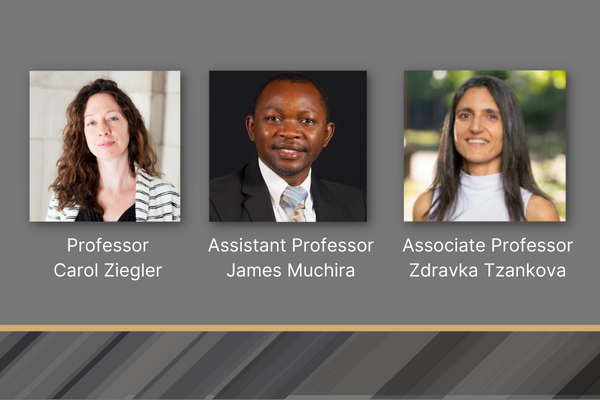 By Tatum Lyles Flick
By Tatum Lyles Flick
Communications Specialist
School of Nursing nurses and a social scientist from the College of Arts and Science have teamed up to mitigate health disparities related to climate change. Professor of Nursing Carol Ziegler, DNP’12, MSN’06, Assistant Professor of Nursing James Muchira, PhD, and Professor of the Practice in Climate Studies Zdravka Tzankova, PhD, have launched the Climate, Energy and Health Equity Lab (CHEEL), based at the Wond’ry and partially funded by a Vanderbilt Immersion Scholar Grant.
The lab will use research and social innovation to tackle climate, energy and health equity problems of high incidence globally, but particularly pervasive in Tennessee and the U.S. as a whole.
“Our work aims to address some of the non-medical causes of diseases,” Muchira said. “For instance, climate change negatively impacts chronic disease risk, occurrence and care in several ways, including the effect on some physiological functions and increased risk of cancers and cardiovascular and kidney diseases. The risk of chronic diseases will continue to increase with increased climate change and related growth in air pollution, malnutrition and extreme weather events.”
According to the United States Environmental Protection Agency, anthropogenic greenhouse gas emissions such as carbon dioxide are responsible for unprecedented and rapid increases in the Earth’s surface temperature. Increases in average temperatures produce a range of cascading impacts, including a variety of negative impacts on health. Examples of this include the spread of dangerous mold in housing, which is exacerbated by more frequent and extreme weather events, or heat exhaustion and air quality problems exacerbated by high temperatures.
Climate change is also a leading driver of conflict over resources, leading to malnutrition and mental health issues. The increased frequency and intensity of extreme weather events can further affect health and wellbeing through their damage to critical infrastructure like transportation systems. Infrastructural damage can mean job loss and loss of access to food and essential resources, particularly for low-income families. Climate change-driven extreme weather events pose growing risks to health infrastructure as well, threatening to disrupt health care in emergencies or evacuations.
“Across the globe, people who have contributed to climate change the least are affected the most,” Ziegler said, pointing to an increase in floods and drought. “Their carbon footprints are tiny, but they’re really bearing the brunt of climate change.”
Muchira agreed, saying “Ultimately, the vulnerable populations, with less reliable safety nets will be hit most, worsening the already existing health disparities.”
As part of their work, members of the CHEEL lab want to determine how corporations and institutions can lower carbon emissions in ways that produce tangible economic, health and environmental benefits for marginalized communities and disadvantaged populations.
The lab will look at how emission reduction, energy efficiency and carbon offsetting can be designed to improve social, environmental and health equity, in addition to generating climate mitigation through lower emissions.
“Work in the CHEEL Lab is grounded in the recognition that, while climate change affects marginalized communities first and worst (i.e., exacerbates existing health, environmental, economic inequalities), economic, environmental and health equity do not automatically follow from climate mitigation and renewable transitions,” Tzankova said.
“While companies can meet carbon reduction pledges through the purchase of carbon offsets, some of their offset projects and programs lead to risks and costs for economically marginalized communities,” Tzankova explained. “Planting forests for the purpose of sequestering carbon and to offset corporate and institutional emissions, for example, can threaten the resources and livelihoods of poor communities by displacing people from agricultural or subsistence land in the name of carbon forestry and offsetting.”
The lab will bring together undergraduate and graduate students, researchers and external organizations. Together, they will work to find ways of reducing climate change while improving health equity and energy justice. Lab members will create tools to help individuals, households, businesses and communities reduce their carbon footprints while increasing human thriving and improving individual and community well-being. The lab directors also hope to have students design programs that compensate low-income families for their low-consumption lifestyles, and/or programs that transfer financial resources to help further reduce the carbon footprints of low-income families and communities.
Immersion Vanderbilt, a university initiative supporting undergraduate students in an intensive learning experience in and beyond the classroom, chose CHEEL as the recipient of an Immersion Scholar Grant. CHEEL offers Immersion students an opportunity to dive into actionable research and participate in cutting-edge social innovation efforts. Many of the CHEEL students will pursue this work as part of their Immersion experience.
In fall and spring of the 2022-2023 academic year, CHEEL is hosting 18 undergraduate students who will identify key health issues experienced by low-income individuals and communities in Nashville, determine baseline carbon footprints of these individuals and households, and work to influence corporate climate spending on climate mitigation projects that directly address health and economic needs of these communities. The end goal is to create resources that connect health care to the carbon market. In year two, the team hopes to build a cohort of health care, law, public policy and engineering students who will combine their experience and knowledge to positively affect public policy.
“Students are naturally drawn to this space of planet and climate change,” Ziegler explained. “We want diversity of thought. This one issue is so complex that we can’t just work from one field. We have to bring in people from different backgrounds.”
CHEEL seeks students with experience in economics, policy, engineering, design, or health equity who are interested in environmental and social justice. Students interested in joining CHEEL should express their interest at the CHEEL website: https://www.vanderbilt.edu/thewondry/programs/social-innovation/climate-health-and-energy-equity-lab/
“Students in the first cohort need to be eager to learn about social innovation and engage in community-driven research,” Ziegler said. “Comfort with independent work and steep learning curves is a must, as is experience with various types of collaborative work. Some interdisciplinary interests and competencies, along with a range of relevant experiences and skills—research, analytical, collaboration, and interpersonal—are a big plus.”